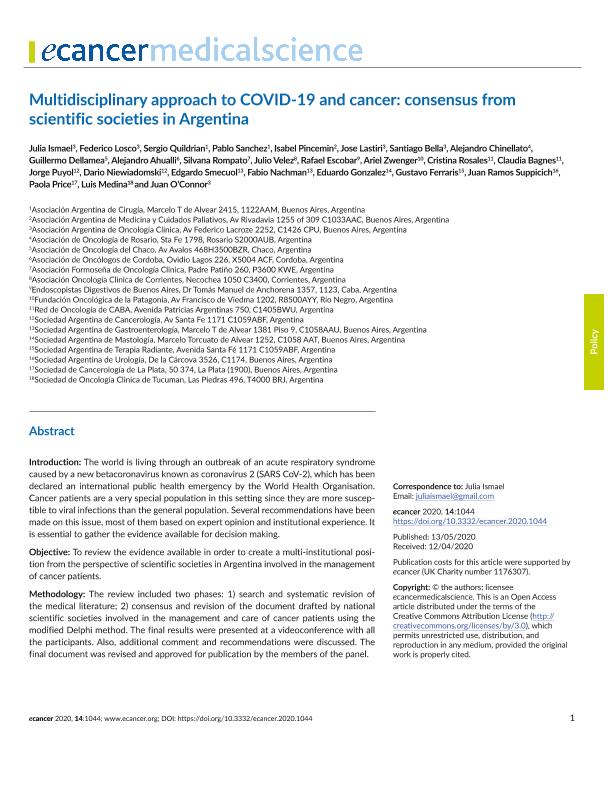Mostrar el registro sencillo del ítem
dc.contributor.author
Ismael, Julia
dc.contributor.author
Losco, Federico
dc.contributor.author
Quildrian, Sergio
dc.contributor.author
Sanchez, Pablo
dc.contributor.author
Pincemin, Isabel
dc.contributor.author
Lastiri, Jose
dc.contributor.author
Bella, Santiago Rafael

dc.contributor.author
Chinellato, Alejandro
dc.contributor.author
Dellamea, Guillermo
dc.contributor.author
Ahualli, Alejandro
dc.contributor.author
Rompato, Silvana
dc.contributor.author
Velez, Julio

dc.contributor.author
Escobar, Rafael
dc.contributor.author
Zwenger, Ariel

dc.contributor.author
Rosales, Cristina
dc.contributor.author
Bagnes, Claudia
dc.contributor.author
Puyol, Jorge
dc.contributor.author
Niewiadomski, Dario
dc.contributor.author
Smecuol, Edgardo
dc.contributor.author
Nachman, Fabio
dc.contributor.author
Gonzalez, Eduardo
dc.contributor.author
Ferraris, Gustavo Nestor

dc.contributor.author
Suppicich, Juan Ramos
dc.contributor.author
Price, Paola
dc.contributor.author
Medina, Luis
dc.contributor.author
O'Connor, Juan
dc.date.available
2023-09-21T14:49:57Z
dc.date.issued
2020-05
dc.identifier.citation
Ismael, Julia; Losco, Federico; Quildrian, Sergio; Sanchez, Pablo; Pincemin, Isabel; et al.; Multidisciplinary approach to COVID-19 and cancer: Consensus from scientific societies in Argentina; Ecancer Global Foundation; Ecancermedicalscience; 14; 5-2020; 1-21
dc.identifier.issn
1754-6605
dc.identifier.uri
http://hdl.handle.net/11336/212528
dc.description.abstract
Introduction: The world is living through an outbreak of an acute respiratory syndrome caused by a new betacoronavirus known as coronavirus 2 (SARS CoV-2), which has been declared an international public health emergency by the World Health Organisation. Cancer patients are a very special population in this setting since they are more susceptible to viral infections than the general population. Several recommendations have been made on this issue, most of them based on expert opinion and institutional experience. It is essential to gather the evidence available for decision making. Objective: To review the evidence available in order to create a multi-institutional position from the perspective of scientific societies in Argentina involved in the management of cancer patients. Methodology: The review included two phases: 1) search and systematic revision of the medical literature; 2) consensus and revision of the document drafted by national scientific societies involved in the management and care of cancer patients using the modified Delphi method. The final results were presented at a videoconference with all the participants. Also, additional comment and recommendations were discussed. The final document was revised and approved for publication by the members of the panel. Results: The consensus panel included 18 representatives from scientific societies from Argentina who assessed the evidence and then made recommendations for the management of cancer patients in our country. International guidelines (CDC; ASCO, NCCN and ESMO) were considered as a background for analysis, as well as institutional guidelines and an open ad hoc survey administered to 114 healthcare professionals from the scientific societies involved in this study. The recommendations are grouped as follows: 1) general care interventions-training of the personnel, cleaning and disinfection of the hospital premises and patient scheduling; 2) treatment decisions-patient care, surgeries, immunosuppressive therapy, radiotherapy and screening; 3) ethical considerations-optimisation of resources, end-of-life care for critically-ill patients; 4) management of hospitalised patients; and 5) wellbeing of the healthcare team. The general recommendation arising from the study is that the management of cancer patients must adapt to the exceptional pandemic status quo without disregarding treatment or cure options. Moreover, healthcare professional accompaniment of all patients should not be neglected. All healthcare professionals must make a significant joint effort to create multidisciplinary teams to discuss the most appropriate measures for each particular situation. Conclusions: The scientific evidence available on this topic worldwide is in progress. This together with the epidemiologically shifting scenario poses unprecedented challenges in the management of cancer amidst this global pandemic. Furthermore, the key role of the healthcare structural organisation appears evident, such as the drafting of clear guidelines for all the stakeholders, adaptability to constant change and an interdisciplinary shared vision through consensus to provide adequate care to our cancer patients in the light of uncertainty and fast-paced change.
dc.format
application/pdf
dc.language.iso
eng
dc.publisher
Ecancer Global Foundation
dc.rights
info:eu-repo/semantics/openAccess
dc.rights.uri
https://creativecommons.org/licenses/by-nc-sa/2.5/ar/
dc.subject
CANCER
dc.subject
CORONAVIRUS
dc.subject
COVID-19
dc.subject
GUIDELINES
dc.subject
RECOMMENDATION
dc.subject.classification
Oncología

dc.subject.classification
Medicina Clínica

dc.subject.classification
CIENCIAS MÉDICAS Y DE LA SALUD

dc.title
Multidisciplinary approach to COVID-19 and cancer: Consensus from scientific societies in Argentina
dc.type
info:eu-repo/semantics/article
dc.type
info:ar-repo/semantics/artículo
dc.type
info:eu-repo/semantics/publishedVersion
dc.date.updated
2023-09-12T17:50:10Z
dc.journal.volume
14
dc.journal.pagination
1-21
dc.journal.pais
Reino Unido

dc.description.fil
Fil: Ismael, Julia. Asociación Argentina de Oncología Clinica; Argentina
dc.description.fil
Fil: Losco, Federico. Asociación Argentina de Oncología Clinica; Argentina
dc.description.fil
Fil: Quildrian, Sergio. No especifíca;
dc.description.fil
Fil: Sanchez, Pablo. No especifíca;
dc.description.fil
Fil: Pincemin, Isabel. Asociación Argentina de Medicina y Cuidados Paliativos; Argentina
dc.description.fil
Fil: Lastiri, Jose. Asociación Argentina de Oncología Clinica; Argentina
dc.description.fil
Fil: Bella, Santiago Rafael. Asociación Argentina de Oncología Clinica; Argentina
dc.description.fil
Fil: Chinellato, Alejandro. Instituto de Oncología de Rosario; Argentina
dc.description.fil
Fil: Dellamea, Guillermo. Asociación de Oncología del Chaco; Argentina
dc.description.fil
Fil: Ahualli, Alejandro. Asociación de Oncólogos de Cordoba; Argentina
dc.description.fil
Fil: Rompato, Silvana. Asociación Formoseña de Oncología Clinica; Argentina
dc.description.fil
Fil: Velez, Julio. Asociación Oncología Clinica de Corrientes; Argentina
dc.description.fil
Fil: Escobar, Rafael. Endoscopistas Digestivos de Buenos Aires; Argentina
dc.description.fil
Fil: Zwenger, Ariel. Consejo Nacional de Investigaciones Científicas y Técnicas. Centro Científico Tecnológico Conicet - Patagonia Norte; Argentina
dc.description.fil
Fil: Rosales, Cristina. No especifíca;
dc.description.fil
Fil: Bagnes, Claudia. No especifíca;
dc.description.fil
Fil: Puyol, Jorge. No especifíca;
dc.description.fil
Fil: Niewiadomski, Dario. Sociedad Argentina de Cancerología (sac); Argentina
dc.description.fil
Fil: Smecuol, Edgardo. Sociedad Argentina de Gastroenterologia; Argentina
dc.description.fil
Fil: Nachman, Fabio. Sociedad Argentina de Gastroenterologia; Argentina
dc.description.fil
Fil: Gonzalez, Eduardo. Sociedad Argentina de Mastología; Argentina
dc.description.fil
Fil: Ferraris, Gustavo Nestor. Sociedad Argentina de Terapia Radiante; Argentina
dc.description.fil
Fil: Suppicich, Juan Ramos. Sociedad Argentina de Urología; Argentina
dc.description.fil
Fil: Price, Paola. Sociedad de Cancerología de la Plata; Argentina
dc.description.fil
Fil: Medina, Luis. Sociedad de Oncología Clinica de Tucuman; Argentina
dc.description.fil
Fil: O'Connor, Juan. Asociación Argentina de Oncología Clinica; Argentina
dc.journal.title
Ecancermedicalscience
dc.relation.alternativeid
info:eu-repo/semantics/altIdentifier/doi/http://dx.doi.org/10.3332/ECANCER.2020.1044
Archivos asociados
